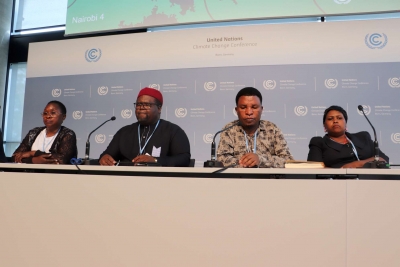
African civil society organisations attending the ongoing climate change conference in Bonn, Germany have called on developed countries to demonstrate leadership and courage in tackling the climate crisis that threatens the common future of humanity and the entire ecosystem.
Led by the Pan African Climate Justice Alliance (PACJA), the activists drawn from different organisations from across Africa reminded the Parties to the UNFCCC of their moral and legal obligations to protect the planet and its people from the existential threat of global warming.
“Africa is at the frontline of climate crisis. We are experiencing the worst effects of a problem that we did not create. Our communities are facing severe water scarcity, crop failures, malnutrition, diseases, displacement, conflicts, heat waves and loss of lives due to climate change. Our natural resources and ecosystems are under immense pressure from climate change and other human activities,” said Dr Mithika Mwenda, the Executive Director – PACJA.
“We are not here to ask for charity or sympathy,” he told delegates during the first civil society briefing in Bonn.
“It is far from that, we are here to demand justice and equity; to demand that the Parties, especially from the North, should stop procrastination; to call on them to listen to the voices of the people, especially those who are most vulnerable and marginalized, and to act following the best available science and the principles of equity and common but differentiated responsibilities,” said Mwenda.
Below are the demands as articulated by the team in Bonn:
- That all Parties cooperate in good faith and in a spirit of solidarity to reach credible progress in the conference. The time for delay and excuses is over. The world is watching and expecting concrete results, and we cannot afford to fail.
- That big polluters increase their mitigation ambition and announce enhanced nationally determined contributions (NDCs) that are consistent with the 1.5°C goal of the Paris Agreement and reflect their fair share of the global effort. The current NDCs are insufficient to close the emissions gap and put the world on a safe, ecologically-just and sustainable pathway. This requires Developed country Parties demonstrate leadership and responsibility by reducing their emissions at source and in providing adequate support to developing countries for their mitigation actions. These countries have a historical and moral obligation to assist developing countries in their transition to low- carbon development and to compensate them for the loss and damage caused by climate change.
- That developed countries take urgent and concrete actions to increase their needs –based adaptation finance for Africa. We urge them to commit to a clear and transparent roadmap for scaling up their support and to ensure that at least 50% of the climate finance provided by developed countries is allocated to adaptation and inform of grants. We stress that this is a matter of justice and equity, as Africa is the most vulnerable region to the impacts of climate change, despite contributing the least to its causes. We also emphasize that adaptation finance is essential for enhancing the resilience and adaptive capacity of our communities, ecosystems and economies. We call on developed countries to deliver on their promises and to meet their obligations under the Paris Agreement and the UNFCCC. We expect them to report on their progress and achievements by the end of 2023, and to demonstrate their solidarity and partnership with Africa in addressing the climate crisis.
- The global goal for adaptation must receive the attention it deserves ; parties must be more decisive in fast-tracking negotiation on this agenda item. Time is running out yet there is so much to be done, since 2015, we have been going round in circles without a clear plan of action on this agenda. This is a make-or-break year for this agenda as time lapse for the work program on global goal for adaptation. We call for parties to clearly establish strong targets under the GGA framework that will enhance adaptation ambition, and at the same time ensure that a standing agenda item is established on the global goal for adaptation beyond the two-year Glasgow Sharm -El -Sheikh work program on global goal for adaptation which ends this year.
- That all parties work together to overhaul the climate finance architecture to ensure that it is transparent, accountable, accessible, and responsive to the needs and priorities of African communities. Specifically, we call for the following actions:
The developed countries must fulfil their commitment to providing at least $100 billion per year by 2020 for climate action in developing countries, and increase this amount significantly in the post-2020 period;
The Green Climate Fund must allocate at least 50% of its resources to adaptation projects and prioritize direct access and enhanced direct access modalities for African countries;
The Adaptation Fund must be replenished and sustained as a key instrument to support adaptation efforts of the most vulnerable countries under the Paris Agreement;
The Climate Technology Centre and Network must enhance its support for technology development and transfer in Africa, especially for locally appropriate and community-based solutions;
The Warsaw International Mechanism for Loss and Damage must operationalize its action and support functions and establish a finance facility, compete with a replenishment mechanism to address the irreversible impacts of climate change in Africa, latest at COP28.










